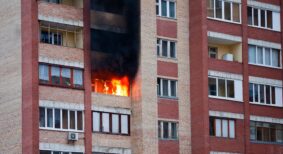Marijuana grow operations can be the gateway to health, safety and financial risks that endure long after criminal activity is discovered and shut down. Rental housing operators often suffer the consequences, and a recent report to the Alberta government suggests they should be more proactively involved in detecting grow operations on their properties.
Alberta’s associate minister of public safety, Rick Fraser, has recommended that his provincial government “consider legislation requiring landlords to inspect a property yearly and evict a tenant immediately if a grow op is discovered” among 37 recommendations in a report released earlier this year. From a tactical perspective, however, residential tenancy laws in all Canadian provinces would ensure that any transgressors would have 24 hours’ notice to hide illicit activity or, worse still, prepare an ambush.
“Such legislation would effectively require that the landlord be conscripted for the purpose of conducting investigations of crime, and that it do so on behalf of law enforcement. I don’t see how it could possibly be valid on that basis alone,” observes Joe Hoffer, a partner and specialist in residential tenancy law with Cohen Highley LLP. “I always advise landlords that if the police want entry into a rental unit, they should give them the keys so they can enter, but landlords should not put themselves in the position of opening the door.”
Many of Fraser’s others recommendations addressing security, safety, health and environmental protection are considered more credible, both within Alberta and beyond provincial borders. This includes an examination of disclosure policies and remediation standards.
He stresses the need for better inter-agency communication, particularly between utilities and police. Notably, utilities are well placed to see spikes in electricity and water consumption typically associated with grow ops, but may not be systematically reporting it to the police. Since the Supreme Court of Canada has ruled – in R. v. Gomboc – that it was acceptable for an electrical utility to divulge a customer’s consumption data, leading to discovery of a marijuana grow op, Fraser calls for further direction to guide utilities in sharing information with the police.
He calls for inspection guidelines and public education so that landlords and/or other tenants can recognize the signs of a grow op and will know how to report it. Once discovered, he recommends heightened transparency so that the public would have access to information about all confirmed grow ops. As part of this, he suggests real estate agents should be required to disclose such information, when available, to potential purchasers.
Several recommendations centre on standardized approaches for environmental monitoring and remediation of grow op premises. This includes guidelines for testing contamination and indoor air quality, protocols for the disposal of hazardous materials and required qualifications for consultants overseeing the work.
Fraser upholds the remediation certificate program now used to signify the appropriate rehabilitation of Alberta’s discontinued oil and gas sites as a possible model for remediation of grow ops. This could be supported with a scaled classification system to indicate the level of remediation a property requires.
“When a building has been made safe, the public currently has no access to information about the types of inspections that were conducted, the findings of these inspections, the permits subsequently applied for and received, and the type of work that was done to remediate,” Fraser’s report states. “This is another area where the proposed process to make information available will prove effective.”
Many of Fraser’s recommendations are aimed at providing lenders and insurers greater confidence to finance and insure properties that formerly housed grow ops. He suggests those key agencies also have a social, if not legal, responsibility to report suspected grow op activities encountered in the course of business.
“Currently, there is no requirement in Alberta for mortgage lenders and insurance companies to notify the local police or municipality if they are aware a property is or was a marijuana grow operation. Mould, air quality, the presence of chemicals in the dwelling, electrical deficiencies and structural integrity issues are all potential dangers associated with former marijuana grow operations. Disclosure about these issues and their remediation makes sense,” he asserts. “Transparency and established criteria for successful remediation will give mortgage lenders and insurance companies confidence about supporting the reintegration of former grow ops into residential communities.”
Meanwhile, condominium corporations and their boards of directors have begun to encounter issues around Canada’s new licensing regime for personal-use medical marijuana. Hoffer stresses that a tenant who possesses a license still needs the owner’s consent to grow marijuana in a residential unit – as is dictated in federal legislation – but, thus far, evictions have been difficult to achieve in these circumstances.
“I have yet to see a residential landlord who is indifferent to someone growing pot plants in an apartment complex,” he reports. “The liability risk is enormous, and now insurers will exclude payouts if the damages arise from a grow op. We don’t need legislation (directed at landlords) to control this. In my view, the insurers are far more effective.”
The complete text of the Grow Op Free Alberta Final Recommendations Report can be found at http://justice.alberta.ca/PROGRAMS_SERVICES/SAFE/GROWOP/Pages/default.aspx
Barbara Carss is the editor-in-chief of Canadian Property Management.




